第五章测试1.On September 5, the XYZ Co. made a $2,500 credit sale, due in 30 days. On October 1, the customer requested and was granted an extension on the payment. The customer was required to sign a 60-day, 5% note on the day of the extension. Payment was made on the maturity date of the note. What is the entry on September 5 to record the credit sale?( )。
A:
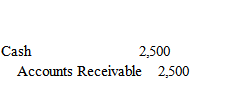 B:
B: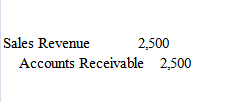 C:
C: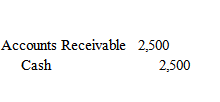 D:
D: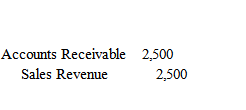
答案:D
2.Refer to Question 1. What is the maturity value of the note? (Round to the closest dollar)( )。
A:$2,500.00 B:$2,479.00 C:$2,625.00 D:$2,521.00 3.Refer to Question 1. What is the entry to record the extension on October 1?( )。
A:
 B:
B: C:
C: D:
D: 4.Refer to Question 1. What is the maturity date of the note?( )。
4.Refer to Question 1. What is the maturity date of the note?( )。A:November 29 B:November 30 C:December 1 D:November 4 5.According to Question 1, What is the entry to record receipt of the payment, on the maturity date of the note?( )。
A:
 B:
B: C:
C: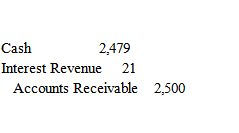 D:
D: 6.When an accounts receivable account has been determined to be uncollectible the entry to record the write off using the allowance method would include:( )。
6.When an accounts receivable account has been determined to be uncollectible the entry to record the write off using the allowance method would include:( )。A:A debit to Uncollectible Account Expense. B:A debit to Accounts Receivable. C:A credit to Notes Receivable. D:A debit to Allowance for Uncollectible Accounts. 7.Which of the following about factoring a receivable is false?( )。
A:The seller receives the amount of the receivable less the financing expenses charged by the financial institution. B:The seller loses control over the collection process. C:The seller receives the full value of the accounts receivable. D:Factoring is often expensive compared to the costs of retaining the receivable on the books. 8.Available-for-sale securities are reported on the balance sheet at:( )。
A:other three choices are not true. B:Fair value. C:Amortized cost. D:Historical cost. 9.An unrealized gain occurs:( )。
A:If the fair value of the investment is greater than the current recorded value. B:other three choices are not true. C:If the fair value of the investment is less than the current recorded value. D:If the sales price is greater than the investment carrying amount. 10.Which method of writing off an uncollectible account does not violate the expense recognition principle?( )。
A:Both Direct write-off method and Allowance method B:Neither Direct write-off method or Allowance method C:Direct write-off method D:Allowance method
温馨提示支付 ¥3.00 元后可查看付费内容,请先翻页预览!

